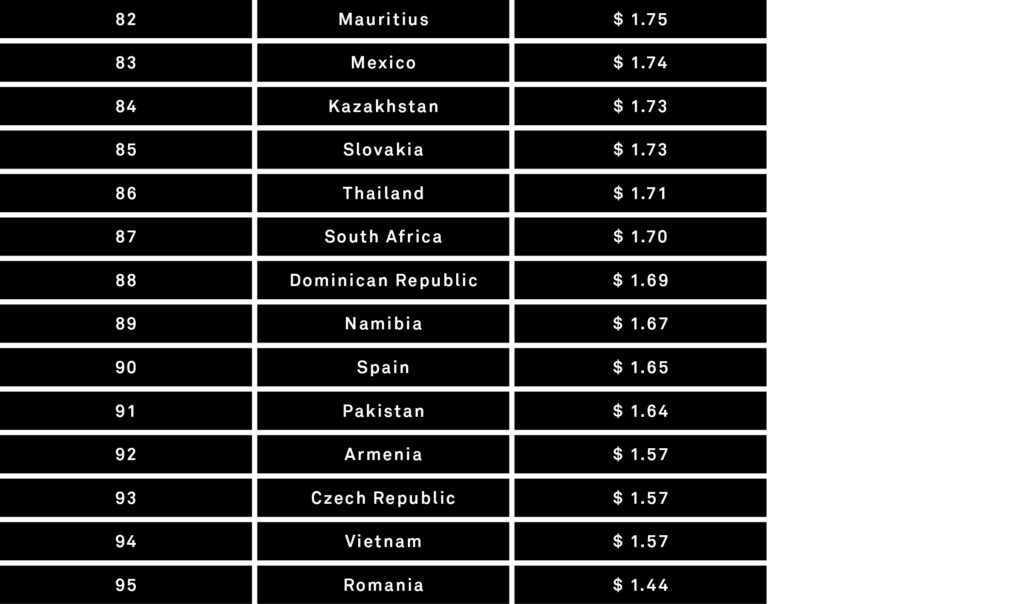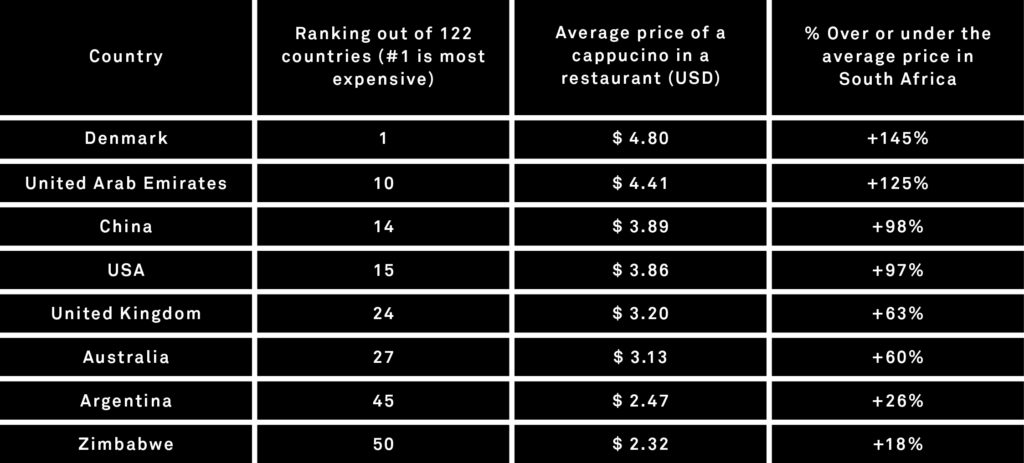The myth about the price of drinking a cup of coffee out in South Africa
RESPECT THE CONSUMER
The team and I at Origin welcome all customers to share their opinions, to decide how and where to spend their hard-earned money, to choose which café serves them the cup of coffee and at the price they want to pay. In light of these decisions, we aim to provide a guide as to what goes into the price of a cup of coffee.
A WORLDWIDE VIEW OF THE PRICE OF A CUP OF COFFEE
Numbeo is a fascinating website and claims to be “the world’s largest database of user contributed data about cities and countries worldwide”. They provide information on living conditions around the world, including cost of living, housing indicators, health care, traffic, crime and pollution.
Interestingly, one of the items Numbeo track in their Basket of Goods & Services used to calculate relative cost of living is the price of a cappuccino in various places around the world.
Most South African consumers may be surprised, after years of increasing coffee cup prices at their favourite cafes, that on average South Africa is ranked as the 87th cheapest cup of coffee out of 122 countries in the survey, where 1 is the most expensive. Other surveys I have seen (such as in Monocle) have reflected a similar view.
Statistics from Numbeo dated 24 February 2017
Aside from our close neighbours above, here are the stats for a few other countries –
Perhaps, before deciding to visit beautiful South Africa on holiday, coffee-mad tourists should consider whether they can find their fix at better value while traveling in Colombia, a coffee producing country selling at $1.28 per cup, for example, or Egypt averaging at $1.13, or the cheapest of all Algeria $0.63. Or, go straight to where it all began: the average cup in Ethiopia is ranked at 118th at the going rate of $0.89.
THE VIEW ON GREAT COFFEE IN SOUTH AFRICA
One should note that most of the cups in the averages above, use commercial or fine commercial coffee and not speciality coffee. These coffees are traded on commodity markets where farmers are often paid very low prices for their hard work. They are at the mercy of the high levels of market volatility (dramatically changing prices for their crop), and from which they do not get rewarded enough for producing higher quality coffee. Most of those average prices for a “regular cappuccino” above are also likely based on a single shot espresso.
South African coffee has changed so much since we launched in 2006. At Origin, we have put in a lot of passion and hard work. We have roasted coffee used to pour more than a million cups of coffee. We have trained over 2,000 baristas who pour our (and many other café’s) coffee. Together with the work of the many other roasteries, the cafes and venues that have committed themselves to serve better coffee, I believe we have transformed Cape Town into a truly world-class coffee (and café) city, with the rest of South Africa soon to follow.
A flat white (double-shot) at Origin sells for R27, 25% more than the South African average. No matter how much better coffee is in South Africa ten years later, I believe that what we serve is far beyond the local average, and an exceptional cup of coffee even by the standard of other top cafés around the world. At an equivalent of $2.04, that Origin flat white is still the 66th cheapest rank out of 122 countries in the survey.
For the health of the farmers who grow all coffee, and of our local baristas and roasters, I think it’s critical that consumers really understand and are conscious of the fact that despite any views they may have to the contrary, the cost of going out to drink a cup of coffee in South Africa is relatively inexpensive compared to the rest of the world. We are fortunate for the quality and price of our coffee as consumers.
So what can you do? The best thing you can do for the local industry and for coffee farmers is to support ethical cafes and roasters who pay their staff well and who source better, speciality-grade, traceable coffees and are willing to pay more for them.
Origin is committed to paying higher prices to farmers for producing the highest quality green coffees. We are committed to achieving technical mastery of the roasting process. We have committed ourselves for over ten years to train an entire generation of South African baristas. We are committed to paying the baristas who work in our cafes living wages which far exceed what many of our competitors pay their peers, including those which you may support regularly.
The next time you pay R27 for a cup at Origin, consider the facts and the true value of what goes into that cup.

